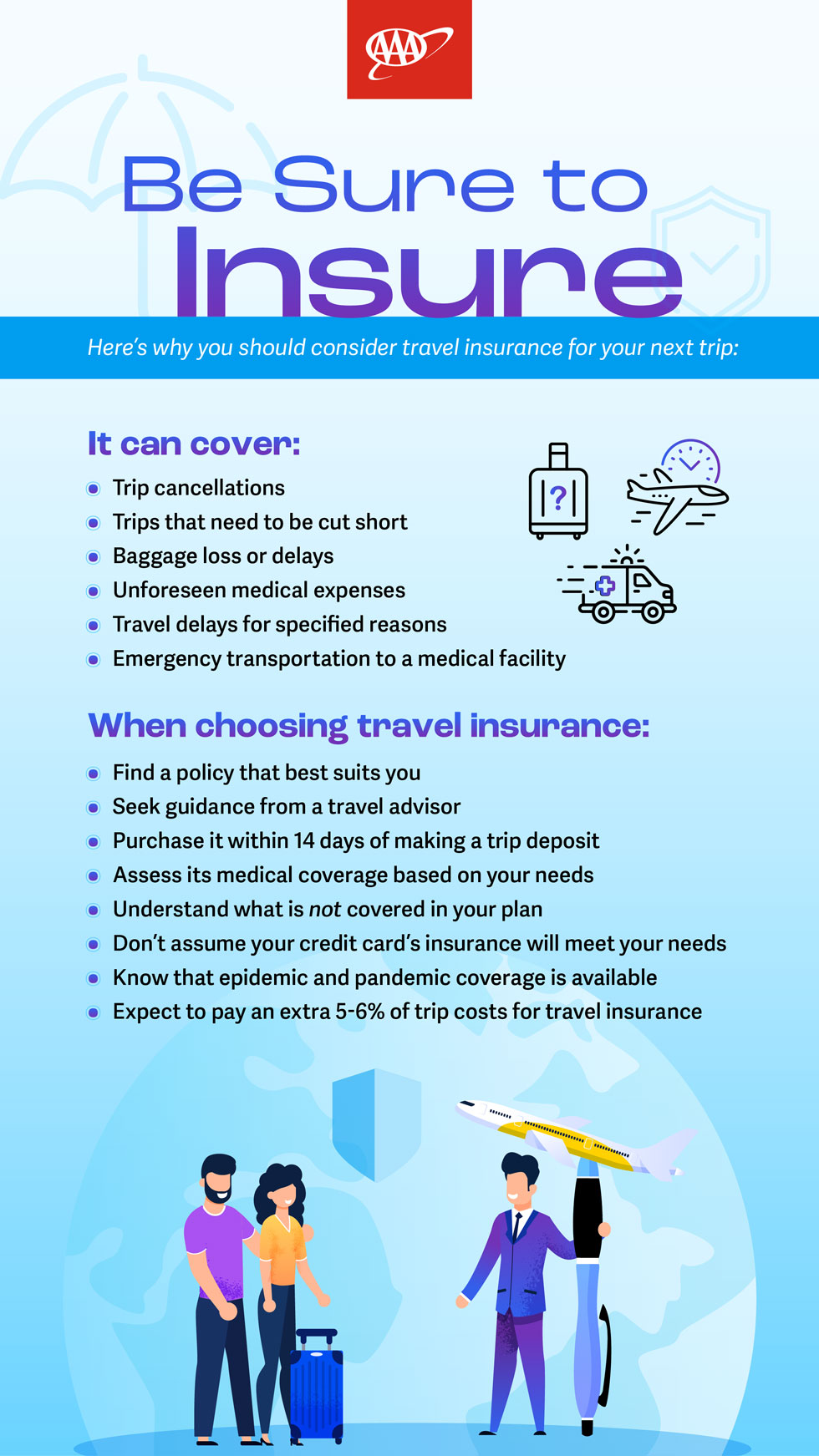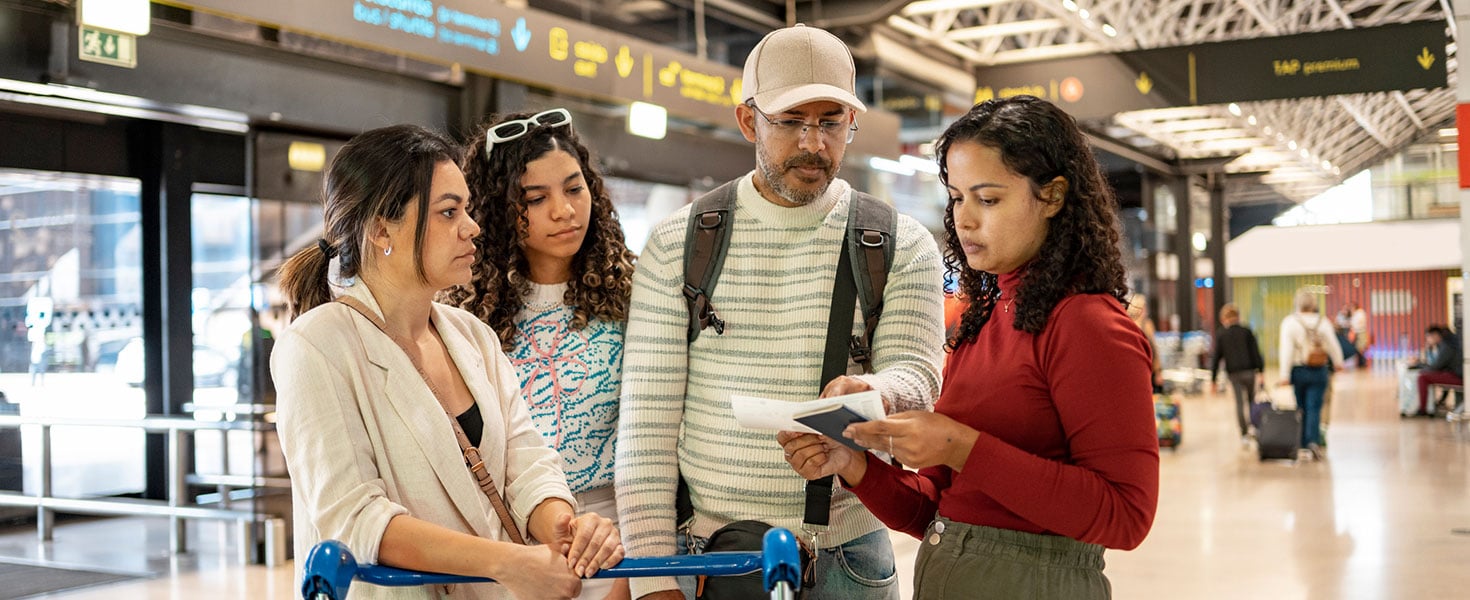
Travel insurance can be an overwhelming expense to consider atop an already costly vacation. Admittedly, even as a seasoned travel industry professional with three decades of globe-trotting under my belt, I have a moment of pause each time I’m confronted with this. Ultimately, I almost always purchase some travel insurance coverage, especially when it’s a complex international trip. It’s primarily motivated by my aging parents—heaven forbid anything should happen to them—and wanting a safety net to return home at a moment’s notice without incurring massive out-of-pocket costs.
This parental paranoia is just a small piece of the greater solace that travel insurance can provide, says AAA Tour Product Manager Randy Osborne. “Everyone can benefit from travel insurance,” he says. “The unexpected happens. It can provide peace of mind and reduce stress during a traumatic situation, as well as a contact to call when traveling abroad.”
Osborne has seen it all. He works directly with AAA Travel Advisors and AAA’s preferred travel insurance provider, Allianz. It’s a vantage point that continually provides him with real-life cautionary travel tales. “I’ve never heard of anyone who needed and used travel insurance regretting having purchased it,” Osborne says. He says the biggest mistake people make is this: “Not getting it at all.” Here are some key things to keep in mind when navigating travel insurance.

1. Consider it a financial safety net for your vacation investment
There is no “one-size-fits-all” travel insurance plan, says Osborne, since available plans will be based on the trip cost, vacation destination(s) and age of the traveler(s). Most comprehensive travel insurance plans, however, will include varying degrees of coverage for the following:
Trip Cancellation
This is a predeparture benefit that provides the ability to recoup travel costs if you cannot travel. It’s typically limited to specific reasons covered in the plan. Osborne advises understanding what these covered reasons are upfront when reviewing plan options.
Trip Interruption
This helps if you need to cut your trip short. Covered reasons typically include an illness or injury during the trip, or a family emergency at home—which, as mentioned earlier, has always been this author’s primary motivator to purchase travel insurance.
Travel Delays
This helps to cover expenses if your travel is delayed due to a covered reason. Osborne advises understanding what constitutes a “travel delay” within the travel insurance plans you are considering.
Medical Expenses
This helps to cover unforeseen medical expenses while traveling to destinations where your U.S.-based health insurance may not work. “Frequently, the biggest covered amounts are for medical,” Osborne says.
Emergency Evacuation Coverage
This typically helps to cover the cost of transportation (plus related medical services and supplies) to a medical facility if you’re seriously injured or ill. The best plans will provide up to $1 million per person for medical evacuation. This can seem high, but evacuation costs can exceed tens of thousands of dollars, especially if you’re traveling to a remote destination.
Baggage Loss or Delays
This helps to recoup costs for lost luggage, as well as damaged or stolen baggage while you are on your trip.

2. Compare plans
In some cases, such as when booking a cruise or a guided group tour vacation, the travel provider may require you to purchase a certain level of travel insurance before you can join the excursion. In these situations, representatives often have options that allow you to bundle travel insurance into the cost of the vacation at the time of booking. Even if this is the case, however, Osborne says it pays to shop around and compare travel insurance plans to see if there is a policy that better suits your needs.
Most travel insurance companies, including Allianz Insurance, have easy-to-use websites that highlight several levels of travel insurance for your trip. These quotes can be used as baselines for building upon or removing elements. Gather a few online quotes, then speak over the phone with a representative to customize.
3. Seek professional guidance
Allow a AAA Travel Advisor to guide you through the process and identify a travel insurance policy that works for your needs, risk tolerance, and budget. The best part: This service is free.
4. Purchase early for the most benefits
You’ll get the best and most comprehensive coverage if you purchase travel insurance within the first 14 days of making a trip deposit. (That clock starts ticking once you put a down payment on any part of the vacation.) The biggest benefits include:
Trip Cancellation
The earlier you buy travel insurance, the sooner you are protected—even before you step on that plane, train, or cruise ship. “Often I get calls from travelers who didn’t expect to need insurance and then have a [medical] diagnosis before travel that prevents them from going,” Osborne says.
Better Trip Cancellation Coverage Options
Many travel insurance companies offer more covered reasons for trip cancellation if you purchase it within 14 days of making an initial trip deposit.
Preexisting Medical Conditions
If you have a pre-existing medical condition, most travel insurance will not cover medical situations due to this condition that arise during your travels— that is, unless you purchase comprehensive travel insurance coverage within the first 14 days of making a trip deposit.
5. Assess medical coverage carefully, especially if you have a pre-existing condition
Most U.S.-based health insurance plans won’t offer medical coverage on non-U.S. soil. Even if you have outstanding health insurance, it may not be very helpful during an international vacation where unexpected medical and health issues arise. This is certainly the case if you’re traveling to more remote areas with limited medical facilities or your vacation includes high-risk excursions and activities. Osborne says it’s important to understand whether travel insurance you’re considering offer primary or secondary medical coverage, and to assess which is best for you.
If you have a pre-existing medical condition or chronic health problems, medical coverage is an especially critical piece of the policy to scrutinize, Osborne says. He recommends consulting a travel insurance specialist so that you are covered accordingly.

6. Understand what is not covered in the policy
It’s easy to focus on what’s included when comparing trip insurance plans. Osborne recommends paying close attention to what is excluded from coverage, too.
Case in point: I recently read about a couple who booked a return flight home after their original flight had been cancelled. When the couple filed a claim with their insurance provider to recoup this cost of this new flight, they learned that this specific scenario was not covered under the policy. (The flight was cancelled due to crew not arriving on time, and the airline was able to rebook the couple on a less-desirable flight home, which the couple declined.)
Clearly understanding the exclusions—and this could be achieved with a simple phone call to the insurance provider’s customer service—could have prevented this financial oops.
7. Be wary to rely only on credit card travel insurance
Just as you should not rely on your U.S.-based health insurance to cover you while traveling internationally, it’s wise to not make assumptions about a credit card that offers travel insurance as one of its perks. Osborne advises reviewing the credit card’s travel insurance coverage amount; the medical coverage policy; whether all trip purchases need to be made with that credit card; and if approved claims results in a cash refund or a travel credit.

8. Be aware that epidemic and pandemic coverage is available
The events of 2020 turned travel on its head, and also impacted the travel insurance industry. As a result, travel insurance companies evolved and most now offer epidemic and pandemic coverage options. “Having coverage for quarantine is at the forefront of people’s minds now,” says Osborne, pointing to the out-of-pocket costs that came with many travelers having to quarantine in a vacation destination when Covid-19 was at a peak.
9. Budget for travel insurance
The average cost of travel insurance is 5% – 6% of your trip costs, according to Forbes Advisors’ analysis of travel insurance rates. If you’re planning an international, bucket-list vacation—and want to protect your investment in the unfortunate event that things go sideways—it’s wise to keep this cost in mind when creating your trip budget. “As much as we don’t want to think about the unexpected, things happen and having the coverage you need when you need it can be a huge benefit,” says Osborne. “If you need it, you will never regret having it."

